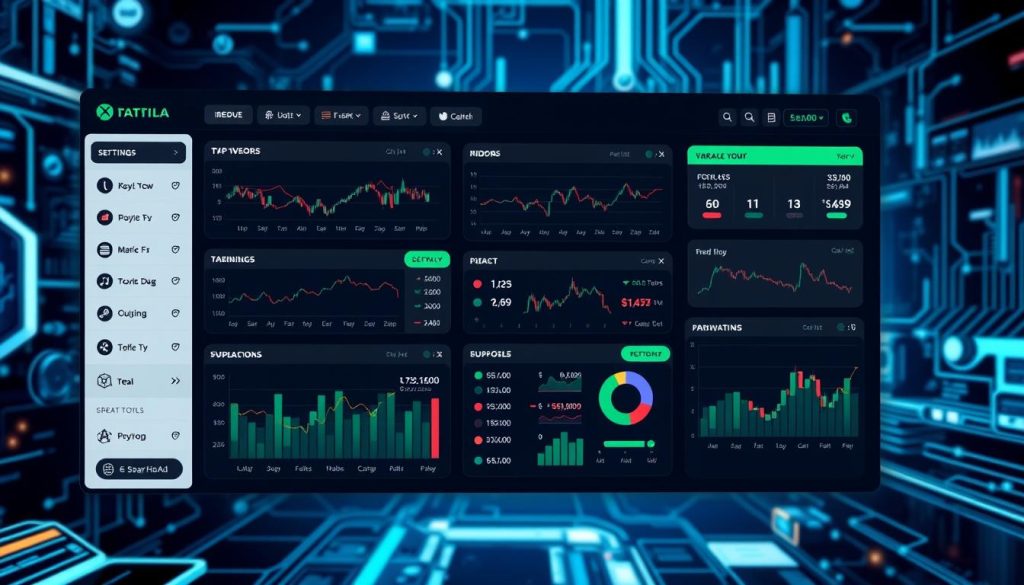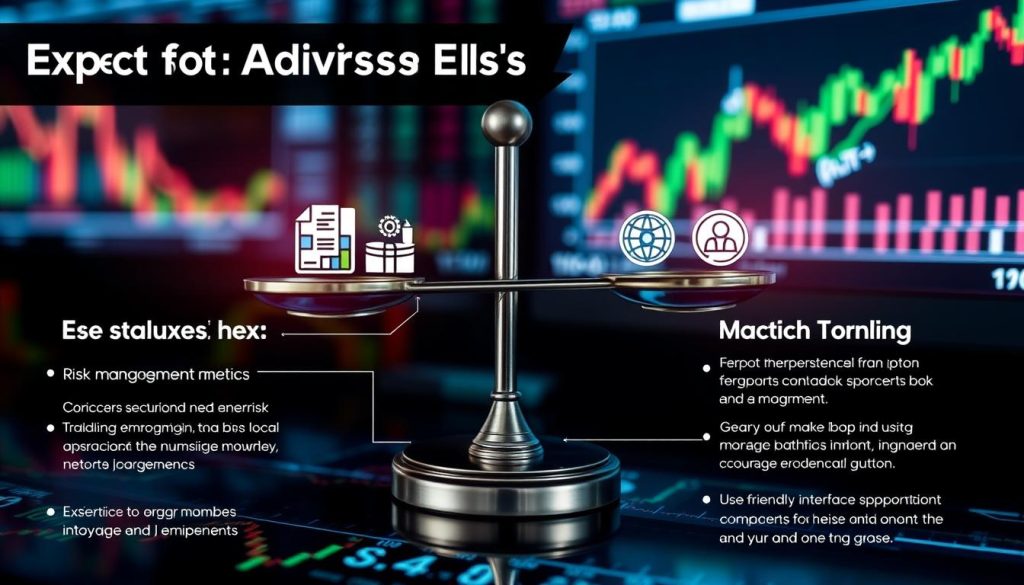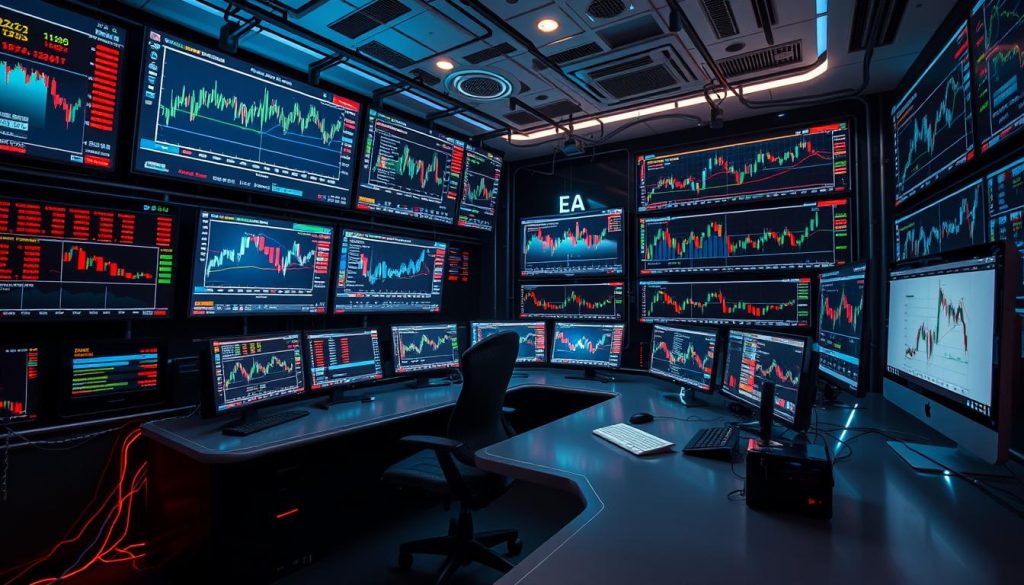How to Choose the Right EA for Prop Firm Evaluations
In the world of proprietary trading, picking the right Expert Advisor (EA) is crucial. Prop firm traders need to find EAs that fit their prop firm’s trading goals, risk management, and rules. This guide helps you choose the best EA for your prop firm, making your automated trading successful.

Key Takeaways
- Learn about the different Expert Advisors and what they do to make a smart choice.
- Find out what features and abilities are needed for prop firm success, like good risk management and backtesting.
- Check if the EAs you’re looking at work well with your firm’s needs, performance, and reliability.
- Look into the trading strategies prop firms use and their costs and returns.
- Focus on the technical needs, platform support, and the reputation of EA providers for smooth integration and support.
Understanding Expert Advisors (EAs) in Prop Trading
In the world of proprietary trading, Expert Advisors (EAs) are changing the game. These automated systems use complex algorithms to make trades. They help prop trading firms stay ahead in the competitive financial world.
Types of Expert Advisors
Prop trading firms use different Expert Advisors for various strategies. There are trend-following, momentum-driven, and mean-reversion models. The right EA depends on the firm’s strategy, risk level, and market conditions.
Fundamental Components of EAs
- Trading Algorithms: These are the core of an EA. They analyze data, find trading chances, and make trades fast and accurately.
- Data Feeds: Good data feeds give EAs the latest market info. This helps them make smart decisions quickly.
- Risk Management Protocols: EAs have features like stop-loss orders to protect money and limit losses.
- Backtesting and Optimization: Testing and fine-tuning EAs before use helps them perform well over time.
Role in Automated Trading
Expert Advisors are key in automated trading, a big part of prop trading. They help traders make fast, precise trades 24/7. This reduces errors and lets traders grab market chances.
| Feature | Benefit |
|---|---|
| Rapid Trade Execution | Seize market opportunities before they vanish |
| Consistent Risk Management | Protect trading capital and minimize losses |
| Continuous Market Monitoring | Identify and act on emerging trends and patterns |
| Backtesting and Optimization | Improve trading strategies and enhance performance |
Knowing about Expert Advisors helps prop trading firms use them wisely. This boosts their edge in the fast-changing financial markets.
Key Features to Look for in Trading EAs
When picking an expert advisor (EA) for prop firm reviews, it’s key to look at several important features. These features are crucial for the EA’s success and reliability. They help decide if the trading algorithm criteria will work well for your automated trading tools.
First, check the EA’s performance indicators. Look at its historical win rates, profit factors, and risk-adjusted returns. A good EA shows steady and reliable trading results, no matter the market.
- Comprehensive historical performance data
- Proven track record of profitable trading
- Favorable risk-reward ratios
Another important thing is the EA’s reliability. It should work well in all market conditions, not just the good ones. Look for features like strong risk management, smart position sizing, and the ability to handle sudden market changes.
| Feature | Description |
|---|---|
| Adaptive Trading Algorithms | The EA should adjust its strategies as the market changes, keeping performance steady. |
| Comprehensive Risk Management | It needs good stop-loss settings, smart position sizing, and drawdown control. |
| Backtesting Capabilities | The EA should offer detailed backtesting results, helping to check its trading strategies. |
By carefully looking at these key features, prop firms can choose the right EA features for their goals and risk levels. Spending time to check these criteria helps find strong and reliable automated trading tools. This can improve the firm’s trading results.

Risk Management Capabilities in EA Selection
Choosing the right Expert Advisor (EA) for your prop firm is key. It’s all about risk management. Look at stop loss, position sizing, and drawdown control.
Stop Loss Implementation
A good EA has strong stop loss tools. It should have dynamic, trailing, or tiered stops. This helps protect your money.
Good stop loss settings are vital for EA risk management. They keep your trading safe.
Position Sizing Features
Effective position sizing is crucial. The best EAs adjust trade sizes based on balance, volatility, and risk. This keeps risk in check.
It ensures no big trade hurts your whole performance.
Drawdown Control Methods
Look for EAs with strong drawdown control methods. They limit big losses. This stops one bad streak from ruining your strategy.
Features like equity curve optimization help manage losses well.
By checking an EA’s risk management, you build a solid trading base. Your prop firm’s success depends on it.
| Risk Management Feature | Benefit |
|---|---|
| Stop Loss Implementation | Limits potential losses and protects capital |
| Position Sizing Features | Optimizes risk exposure and trade sizes |
| Drawdown Control Methods | Manages consecutive losses and protects against significant drawdowns |
Backtesting Requirements for Prop Firm EAs
When looking at Expert Advisors (EAs) for prop trading firms, backtesting is key. Prop firms must check if these automated systems work well. They do this by testing them against past market data.
Doing a deep EA backtesting helps prop firms check a few important things:
- Historical data analysis: They see if the EA can handle different market situations, like when prices are all over the place or moving steadily.
- Trading strategy validation: They make sure the EA’s way of trading is smart and keeps making money over time.
- Risk management capabilities: They look at how well the EA controls losses, stops losses, and sizes positions.
Prop firms usually want EAs to show strong backtesting results for at least 3-5 years. This long historical data analysis lets them really check how the EA performs and if it can handle market changes.
“Backtesting is the cornerstone of any successful prop trading strategy. It’s essential for validating the EA’s trading logic and ensuring it can withstand the real-world challenges of the market.”
By backtesting EAs well, prop firms can pick the best ones for their goals, risk levels, and standards. This careful check helps avoid big losses and makes sure the EAs fit well with the firm’s trading.

How to Choose the Right EA for Prop Firm Evaluations
Choosing the right Expert Advisor (EA) for prop firm evaluations is key. You need to check if the EA fits well with your firm, look at its past performance, and see if it’s reliable. These steps are vital in picking the right EA.
Compatibility Checks
First, check if the EA works well with your trading platform and strategies. Make sure its features match what your firm needs. This ensures the EA works smoothly and effectively in your trading setup.
Performance Metrics
Look closely at the EA’s past performance. Check its win-rate, average profit per trade, and drawdown. These metrics show how well the EA has done in the past and its potential for future success.
Reliability Factors
- Stability: Check if the EA stays consistent in different market conditions.
- Robustness: See how well the EA handles sudden market changes without losing its strategy.
- Transparency: Choose EAs that are open about their trading methods. This lets your firm understand and trust the EA’s actions.
By carefully checking the EA’s compatibility, performance, and reliability, prop firms can pick the best EA for their needs.

“Selecting the right EA is a critical step in ensuring the success of your prop firm’s automated trading operations. Take the time to carefully assess the EA’s capabilities, performance, and reliability to ensure it aligns with your firm’s unique requirements.”
Common EA Trading Strategies for Prop Firms
In the fast-paced world of algorithmic trading, prop firms use many EA trading strategies to stand out. These automated systems, powered by advanced algorithms, are key to many prop trading successes.
One strategy is the trend-following approach. These EAs spot and make money from market trends, whether they’re up or down. They use smart technical analysis and pattern recognition to quickly adjust to market changes. This helps prop traders follow market trends effectively.
Another strategy is the mean reversion technique. These EAs work on the idea that asset prices always come back to a long-term average. By finding and using short-term price swings, these systems can make steady profits for prop firms.
Prop firms are also looking into more complex algorithmic trading methods, like statistical arbitrage and market-making. These EAs use machine learning, data analysis, and advanced math to find and use market price gaps. They work across different markets and asset types.
Choosing the right EA trading strategies for prop firms is a careful process. It needs a deep understanding of the market, risk management, and the firm’s specific needs. By picking and using these advanced systems wisely, prop firms can fully benefit from automated trading and stay ahead in the changing financial world.
| Strategy | Description | Key Advantages |
|---|---|---|
| Trend-Following | Designed to identify and capitalize on emerging market trends. | Adaptability to changing market conditions, potential for consistent returns. |
| Mean Reversion | Exploits short-term deviations from asset price equilibrium levels. | Consistent returns, potential for lower volatility. |
| Statistical Arbitrage | Leverages machine learning and advanced models to identify pricing inefficiencies. | Potential for consistent, low-risk returns, diversification of trading strategies. |

“The success of prop firms in the era of algorithmic trading hinges on their ability to identify and implement the right mix of EA trading strategies that align with their unique trading objectives and risk profiles.”
Price Considerations and ROI Analysis
Choosing the right Expert Advisor (EA) for your prop firm involves looking at prices and expected returns. It’s key to weigh the initial cost, ongoing fees, and potential earnings. This helps you pick an EA that fits your trading plan and budget.
Initial Investment
The cost of an EA can differ a lot. It depends on the trading system’s complexity, the provider, and any custom needs. Some EAs cost a one-time fee, while others need a yearly or monthly payment. Make sure you know all about the costs upfront.
Monthly Subscription Costs
Many EAs also have a monthly or yearly fee. These fees cover updates, support, and new features. Think about how these costs add up and if they’re worth it for your trading.
Expected Returns
The main reason for using an EA is to make money. Look at its past performance, backtesting, and any success stories. This info helps you guess how much money it might make for your firm.
Understanding EA costs and potential earnings is crucial. It helps you choose the best EA for your firm. This careful thought ensures your investment in trading tools meets your business goals and offers a good return.

“Proper evaluation of EA pricing and ROI is essential for prop firms to make informed decisions and maximize their trading performance.”
Technical Requirements and Platform Compatibility
When using Expert Advisors (EAs) in prop trading, it’s key to match technical needs with platform compatibility. Your EA system must work smoothly with your trading platform for success and top performance.
The EA system requirements are crucial. You need the right hardware and software to run your EA well. Things like processor speed, RAM, and storage affect how fast and efficient your EA can trade.
Also, trading platform compatibility is vital. Most prop trading uses MetaTrader 4 (MT4) and MetaTrader 5 (MT5). Your EA must work well with these platforms. It needs to use the right APIs, data feeds, and order systems.
| Platform | Compatibility | Key Features |
|---|---|---|
| MetaTrader 4 (MT4) | Fully compatible | Robust scripting language (MQL4) Extensive plugin ecosystem Widely adopted in the forex and CFD trading community |
| MetaTrader 5 (MT5) | Fully compatible | Advanced features like multi-asset trading and NETTING order types Enhanced scripting language (MQL5) Improved performance and scalability |
By checking the EA system requirements and ensuring trading platform compatibility, prop trading firms can make sure their systems work well. This leads to consistent and reliable trading results.

Popular EA Providers and Their Reputation
Choosing the right Expert Advisor (EA) for your prop firm is key. Knowing the reputation and track record of top EA providers is vital. These software solutions are crucial for automated trading. Their reliability can greatly impact your trading success.
Let’s look at some market leaders and their customer feedback. This will help you make a well-informed decision.
Market Leaders
Names like MetaQuotes, FX Blue, and Tradency are at the top. They offer robust trading platforms and advanced EAs. These meet the needs of both prop firms and individual traders.
Their products are known for their features, stability, and technical support. This makes them stand out in the industry.
Customer Reviews
- MetaQuotes, the creators of MetaTrader, get lots of positive feedback. Customers love their software suite and the wide range of EAs available for customization.
- FX Blue is praised for its easy-to-use tools and reliable data analysis. Prop firms use it to check their trading strategies.
- Tradency’s Mirror Trader is known for working well with many brokers. It offers great portfolio management features. Customers find it easy to use and offers many trading strategies.
Support Quality
The quality of customer support is crucial for trading software. Top EA providers, like those mentioned, have great support teams. They help with technical issues and trading questions.
This level of support ensures smooth trading operations. By researching these providers, prop firms can choose the best trading solutions. This will help them achieve their goals in automated trading.
EA Customization and Optimization Options
In the world of prop trading, the right EA customization and optimization are crucial. Expert Advisors (EAs) are powerful tools that can be fine-tuned for prop firms. This allows for better trading algorithm optimization and strategy fine-tuning.
EAs are flexible, which is a big plus. Prop firms can work with EA providers to customize trading algorithms and adjust risk management. This ensures the EA fits the firm’s trading style and risk level perfectly.
- Strategy Optimization: Prop firms can refine trading strategies with EA providers. They can tweak entry and exit conditions for better performance.
- Parameter Adjustments: EA customization lets firms control various parameters. This includes position sizing, stop-loss levels, and take-profit targets for effective risk management.
- Indicator Integration: Prop firms can add their favorite technical and fundamental indicators to the EA. This gives a deeper analysis of market trends and opportunities.
| Customization Feature | Benefit |
|---|---|
| Trading Strategy Refinement | Aligns the EA with the prop firm’s trading philosophy and market dynamics |
| Risk Management Parameters | Enhances drawdown control and position sizing for optimal risk-return balance |
| Indicator Integration | Provides a more comprehensive and nuanced analysis of market conditions |
By using EA customization, prop firms can gain a competitive edge. They can optimize their trading systems to seize new opportunities and reduce risks. This tailored approach can be a game-changer in the competitive world of prop trading.

Real-Time Monitoring and Performance Tracking
Effective EA performance monitoring and real-time trading analytics are key for prop firms. They help make smart decisions and boost returns. Advanced performance reporting gives a full view of an Expert Advisor’s (EA) performance. This lets firms keep improving and fine-tuning for the best results.
Performance Metrics
Prop firms need EAs with strong performance metrics to track trading. Important metrics include win rate, profit factor, maximum drawdown, and risk-adjusted returns. These show how well an EA works and how it manages risk.
Reporting Features
- Detailed trade history logs
- Real-time position monitoring
- Customizable performance dashboards
- Automated reporting and data visualization
Strong reporting features help prop firms watch an EA’s real-time trading analytics closely. They can make smart changes to trading strategies and risk management. It’s important for the trading platform to work well with these features for efficient tracking and decision-making.
“Comprehensive performance reporting is the backbone of a successful prop trading operation. It’s the key to unlocking the full potential of your automated trading strategies.”
By focusing on EAs with top-notch EA performance monitoring and reporting, prop firms can stay ahead. They can improve trading performance and ensure steady growth in their automated trading.
Legal and Compliance Considerations
Using Expert Advisors (EAs) for prop firm evaluations requires careful attention to legal and compliance rules. Prop firms must follow EA trading regulations closely. This ensures their automated trading is safe and legal, protecting both the firm and its clients.
Keeping up with automated trading laws is a big challenge. Laws about algorithmic trading change often and differ by region. Not following these laws can lead to big fines or even lawsuits. It’s important for prop firms to know and follow the rules that apply to them.
- Learn about the rules for automated trading, like licenses and data sharing.
- Make sure your EAs meet all necessary regulations, like position limits and trade rules.
- Have strong systems in place to catch and fix any legal issues quickly.
Prop firms also need to think about data privacy and security with EAs. They must handle client and trading data carefully. This includes secure storage and plans for emergencies.
“Compliance is not just a box to be checked, but a fundamental pillar of successful prop firm operations in the era of automated trading.”
By focusing on legal and compliance, prop firms can use EAs wisely. This helps reduce risks and promotes fair, open trading practices.
Common Mistakes to Avoid When Selecting EAs
Choosing the right Expert Advisor (EA) for your prop firm is key. But, it’s easy to make mistakes. Let’s look at some common pitfalls to avoid.
Technical Pitfalls
One big challenge is making sure the EA works with your system. If you don’t check the system requirements or platform compatibility, you might face problems. Make sure the EA’s technical specs match your trading setup.
- Check if the EA works with your trading platform and broker.
- Look at the EA’s system needs, like hardware and software.
- See if the EA fits well with your current trading tools and workflows.
Strategy Misalignment
Another mistake is picking an EA that doesn’t match your firm’s goals or risk level. It’s important to find an EA with the right strategy. This helps avoid trading strategy mistakes and automated trading pitfalls.
- Learn about the EA’s strategy, including its algorithms and decision-making.
- Check if the strategy fits your firm’s trading style and risk profile.
- Test the EA’s performance to see if it meets your expectations.
By avoiding these EA selection errors, you can make a better choice. This increases the chances of a successful EA integration. It helps achieve the desired performance and risk management goals.
EA Testing and Validation Process
Checking an Expert Advisor (EA) is key before using it in prop firm tests. The testing and validation process checks if the EA works well and gives good results. This helps prop firms pick the best EA for their trading needs.
The first step is backtesting. Prop firms test the EA under different market conditions and with past data. They check if the EA makes money and handles risks well. They also see how it does in tough market times.
Then, prop firms look at the EA’s stability and reliability. They test it under high trading volumes and sudden market changes. They also check how it handles problems like sudden stops or data issues. This ensures the EA keeps working smoothly.
FAQ
What is the primary purpose of an Expert Advisor (EA) in prop firm evaluations?
Expert Advisors (EAs) are key in prop firm evaluations. They help with automated trading strategies. These software programs analyze market data, execute trades, and manage risk based on set algorithms and trading rules.
What are the key features to consider when selecting an EA for prop firm evaluations?
When picking an EA, look for certain features. These include performance indicators, reliability, and adaptability to market changes. Also, consider robust risk management and advanced backtesting capabilities.
How can EAs help with risk management in prop firm evaluations?
EAs improve risk management by using stop-loss strategies and advanced position sizing. They also have drawdown control methods. These help reduce losses and keep the trading system stable and reliable.
What is the importance of backtesting in the EA selection process for prop firms?
Backtesting EAs is vital for prop firms. It lets them check an EA’s performance with historical data. This helps identify weaknesses and ensures the EA meets their needs and risk levels.
How can prop firms ensure the technical compatibility and platform integration of the selected EAs?
Prop firms should check technical requirements and platform integration. This includes hardware and software compatibility and integration with platforms like MetaTrader 4 or MetaTrader 5.
What are some common EA trading strategies used in prop firm evaluations?
Prop firms use various EA strategies. These include trend-following, mean reversion, and other algorithmic approaches. They aim to capitalize on market movements and generate consistent returns.
How can prop firms evaluate the ROI (Return on Investment) of different EA options?
Prop firms should analyze EA pricing. This includes the initial investment, monthly costs, and expected returns. They need to ensure the EA fits their budget and goals.
What are some common mistakes to avoid when selecting EAs for prop firm evaluations?
Prop firms should avoid technical pitfalls and strategy misalignment. Technical issues like compatibility problems or software glitches are common. Also, the EA’s trading approach should match the firm’s risk profile and investment goals.
How can prop firms effectively test and validate the performance of EAs before deploying them?
The testing and validation process should be thorough. It should include performance evaluations, stability assessments, and reliability checks. This ensures the EA meets the firm’s standards and delivers consistent trading outcomes.
Struggling with your challenge? Our prop firm ea ensures success.
